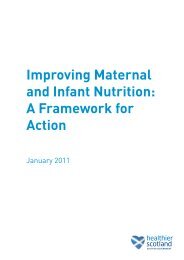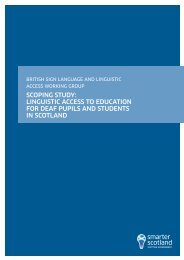- Page 1 and 2:
Children’s Needs - Parenting Capa
- Page 3 and 4:
Published for the Department for Ed
- Page 5 and 6:
ivChildren’s Needs - Parenting Ca
- Page 7 and 8:
List of figures and tablesFiguresFi
- Page 9 and 10:
AcknowledgementsWe acknowledge with
- Page 11 and 12:
2 Children’s Needs - Parenting Ca
- Page 13 and 14:
4 Children’s Needs - Parenting Ca
- Page 15 and 16:
6 Children’s Needs - Parenting Ca
- Page 17 and 18:
8 Children’s Needs - Parenting Ca
- Page 19 and 20:
10 Children’s Needs - Parenting C
- Page 21 and 22:
12 Children’s Needs - Parenting C
- Page 23 and 24:
14 Children’s Needs - Parenting C
- Page 25 and 26:
16 Children’s Needs - Parenting C
- Page 27 and 28:
18 Children’s Needs - Parenting C
- Page 29 and 30:
PART I: GENERAL ISSUESAFFECTING PAR
- Page 31 and 32:
24 Children’s Needs - Parenting C
- Page 33 and 34:
26 Children’s Needs - Parenting C
- Page 35 and 36:
28 Children’s Needs - Parenting C
- Page 37 and 38:
30 Children’s Needs - Parenting C
- Page 39 and 40:
32 Children’s Needs - Parenting C
- Page 41 and 42:
34 Children’s Needs - Parenting C
- Page 43 and 44:
36 Children’s Needs - Parenting C
- Page 45 and 46:
38 Children’s Needs - Parenting C
- Page 47 and 48:
40 Children’s Needs - Parenting C
- Page 49 and 50:
42 Children’s Needs - Parenting C
- Page 51 and 52:
44 Children’s Needs - Parenting C
- Page 53 and 54:
46 Children’s Needs - Parenting C
- Page 55 and 56:
48 Children’s Needs - Parenting C
- Page 57 and 58:
50 Children’s Needs - Parenting C
- Page 59 and 60:
52 Children’s Needs - Parenting C
- Page 61 and 62:
54 Children’s Needs - Parenting C
- Page 63 and 64:
56 Children’s Needs - Parenting C
- Page 65 and 66:
58 Children’s Needs - Parenting C
- Page 67 and 68:
60 Children’s Needs - Parenting C
- Page 69 and 70:
62 Children’s Needs - Parenting C
- Page 71 and 72:
64 Children’s Needs - Parenting C
- Page 73 and 74:
66 Children’s Needs - Parenting C
- Page 75 and 76:
68 Children’s Needs - Parenting C
- Page 77 and 78:
70 Children’s Needs - Parenting C
- Page 79 and 80:
72 Children’s Needs - Parenting C
- Page 81 and 82:
74 Children’s Needs - Parenting C
- Page 83 and 84:
76 Children’s Needs - Parenting C
- Page 85 and 86:
78 Children’s Needs - Parenting C
- Page 87 and 88:
80 Children’s Needs - Parenting C
- Page 89 and 90:
82 Children’s Needs - Parenting C
- Page 91 and 92:
3Which children are most at risk of
- Page 93 and 94:
Which children are most at risk of
- Page 95 and 96:
Which children are most at risk of
- Page 97 and 98:
Which children are most at risk of
- Page 99 and 100:
Which children are most at risk of
- Page 101 and 102:
Which children are most at risk of
- Page 103 and 104:
4Child development and parents’re
- Page 105 and 106:
Child development and parents’ re
- Page 107 and 108:
Child development and parents’ re
- Page 109 and 110:
Child development and parents’ re
- Page 111 and 112:
Child development and parents’ re
- Page 113 and 114:
Child development and parents’ re
- Page 115 and 116:
Child development and parents’ re
- Page 117 and 118:
Child development and parents’ re
- Page 119 and 120:
Child development and parents’ re
- Page 121 and 122:
Child development and parents’ re
- Page 123 and 124:
Child development and parents’ re
- Page 125 and 126: Child development and parents’ re
- Page 127 and 128: Child development and parents’ re
- Page 129 and 130: Child development and parents’ re
- Page 131 and 132: Child development and parents’ re
- Page 133 and 134: Child development and parents’ re
- Page 135 and 136: Child development and parents’ re
- Page 137 and 138: Child development and parents’ re
- Page 139 and 140: Child development and parents’ re
- Page 141 and 142: 5Child development and parents’re
- Page 143 and 144: Child development and parents’ re
- Page 145 and 146: Child development and parents’ re
- Page 147 and 148: Child development and parents’ re
- Page 149 and 150: Child development and parents’ re
- Page 151 and 152: Child development and parents’ re
- Page 153 and 154: Child development and parents’ re
- Page 155 and 156: Child development and parents’ re
- Page 157 and 158: Child development and parents’ re
- Page 159 and 160: Child development and parents’ re
- Page 161 and 162: Child development and parents’ re
- Page 163 and 164: 6Child development and parents’re
- Page 165 and 166: Child development and parents’ re
- Page 167 and 168: Child development and parents’ re
- Page 169 and 170: Child development and parents’ re
- Page 171 and 172: Child development and parents’ re
- Page 173 and 174: Child development and parents’ re
- Page 175: Child development and parents’ re
- Page 179 and 180: Child development and parents’ re
- Page 181 and 182: Child development and parents’ re
- Page 183 and 184: Child development and parents’ re
- Page 185 and 186: Child development and parents’ re
- Page 187 and 188: Child development and parents’ re
- Page 189 and 190: Child development and parents’ re
- Page 191 and 192: Child development and parents’ re
- Page 193 and 194: Child development and parents’ re
- Page 195 and 196: Child development and parents’ re
- Page 197 and 198: Child development and parents’ re
- Page 199 and 200: Child development and parents’ re
- Page 201 and 202: PART III: CONCLUSIONS ANDIMPLICATIO
- Page 203 and 204: 200 Children’s Needs - Parenting
- Page 205 and 206: 202 Children’s Needs - Parenting
- Page 207 and 208: 204 Children’s Needs - Parenting
- Page 209 and 210: 206 Children’s Needs - Parenting
- Page 211 and 212: 208 Children’s Needs - Parenting
- Page 213 and 214: BibliographyAbel, E.L. (1998) ‘Fe
- Page 215 and 216: Bibliography 213Barnardo’s (2005)
- Page 217 and 218: Bibliography 215Brandon, M., Bailey
- Page 219 and 220: Bibliography 217Children’s Workfo
- Page 221 and 222: Bibliography 219Davies, C. and Ward
- Page 223 and 224: Bibliography 221Department for Heal
- Page 225 and 226: Bibliography 223Edwards, A. and Smi
- Page 227 and 228:
Bibliography 225Flately, J., Kersha
- Page 229 and 230:
Bibliography 227Gottlieb, S. (2002)
- Page 231 and 232:
Bibliography 229HM Government (2011
- Page 233 and 234:
Bibliography 231Jaffe, P., Wolfe, D
- Page 235 and 236:
Bibliography 233Kolar, A., Brown, B
- Page 237 and 238:
Bibliography 235Margison, F. and Br
- Page 239 and 240:
Bibliography 237Merikangas, K., Die
- Page 241 and 242:
Bibliography 239Murray, L., Cooper,
- Page 243 and 244:
Bibliography 241Office for National
- Page 245 and 246:
Bibliography 243Priory Group (2006)
- Page 247 and 248:
Bibliography 245Royal College of Ph
- Page 249 and 250:
Bibliography 247Singleton, N., Bump
- Page 251 and 252:
Bibliography 249Swofford, C. D., Sc
- Page 253 and 254:
Bibliography 251Walker, F. (1995) Y
- Page 255 and 256:
Indexabuse see child abuse; child n
- Page 257 and 258:
Index 255children 16 years and over
- Page 259 and 260:
Index 257problem drug use 52, 53, 5
- Page 261 and 262:
Index 259eating disorders 54, 137,
- Page 263 and 264:
Index 261mothers’ problem drug us
- Page 265 and 266:
Index 263MARAC (multi-agency risk a
- Page 267 and 268:
Index 265cognitive and language dev
- Page 269 and 270:
Index 267definition 26domestic viol
- Page 271 and 272:
Index 269withdrawal symptoms 53, 56
- Page 273 and 274:
Index 2713-4 years 1335-10 years 14
- Page 275 and 276:
Index 273parental mental illness 30
















